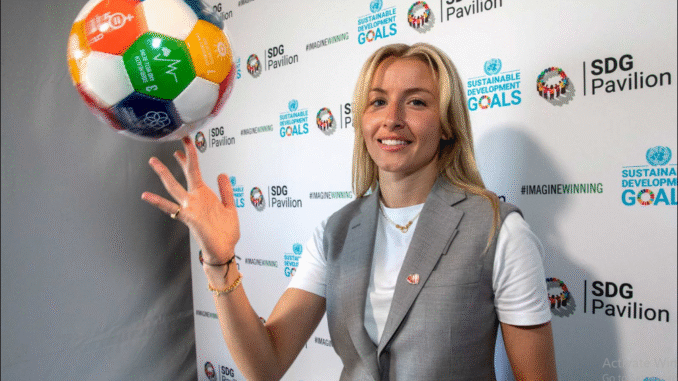
Leah Williamson, the renowned English football star and captain of Arsenal Women, has recently taken a significant step in promoting authenticity and inclusivity within the world of sports by openly discussing her sexuality. Her candidness not only humanizes her beyond her athletic achievements but also sparks important conversations about identity, acceptance, and representation in modern sport.
In a heartfelt interview, Williamson shared that she is proud to be open about her sexuality, emphasizing that embracing her true self has been a journey of self-discovery and empowerment. She acknowledged that sports, historically characterized by traditional expectations and gender norms, can often feel like a challenging environment for those exploring or expressing their authentic identities. By speaking openly, Leah aims to break down barriers and encourage others—especially young athletes—to feel confident and safe in being true to themselves.
Williamson’s openness is particularly impactful given her high-profile role as a leader in women’s football. Her visibility provides a powerful platform to challenge stereotypes and promote diversity within the sport. She highlighted that representation matters, and when athletes feel supported and accepted, it creates a more inclusive environment where everyone can thrive regardless of their background or identity. Her honesty also underscores the importance of mental health and personal well-being, reminding fans and fellow players that authenticity can lead to a more fulfilling life both on and off the pitch.
Moreover, Leah’s willingness to discuss her sexuality publicly inspires broader conversations beyond sports. It encourages fans and society at large to reconsider notions of masculinity, femininity, and identity, fostering a culture where acceptance is the norm. Her advocacy aligns with a growing movement within sports to create safe spaces for LGBTQ+ athletes and promote equality. Many young fans look up to her not just for her athletic prowess but also for her integrity and courage, which can serve as a catalyst for positive change.
Her openness also challenges the stigma and misconceptions that still linger around sexuality in sports. By sharing her story, Williamson helps normalize diverse identities and emphasizes that being true to oneself should be celebrated rather than hidden. This transparency can inspire other athletes to come out or express their authentic selves without fear of judgment or discrimination.
In conclusion, Leah Williamson’s candid discussion about her sexuality marks a significant milestone in the ongoing fight for inclusivity and authenticity in modern sport. Her bravery and honesty serve as a beacon of hope and inspiration, encouraging a culture where diversity is embraced, and everyone can compete and succeed as their true selves. As she continues to lead both on and off the field, Leah Williamson exemplifies how sports can be a powerful platform for social change, empowering individuals to live authentically and fostering a more inclusive future for all.
Leave a Reply